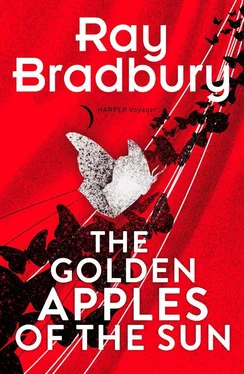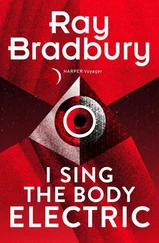We reached the bottom as the tower buckled down toward us. We ducked under the stairs into the small stone cellar. There were a thousand concussions as the rocks rained down; the Fog Horn stopped abruptly. The monster crashed upon the tower. The tower fell. We knelt together, McDunn and I, holding tight, while our world exploded.
Then it was over, and there was nothing but darkness and the wash of the sea on the raw stones.
That and the other sound.
“Listen,” said McDunn quietly. “Listen.”
We waited a moment. And then I began to hear it. First a great vacuumed sucking of air, and then the lament, the bewilderment, the loneliness of the great monster, folded over and upon us, above us, so that the sickening reek of its body filled the air, a stone’s thickness away from our cellar. The monster gasped and cried. The tower was gone. The light was gone. The thing that had called to it a million years was gone. And the monster was opening its mouth and sending out great sounds. The sounds of a Fog Horn, again and again. And ships far at sea, not finding the light, not seeing anything, but passing and hearing late that night, must’ve thought: There it is, the lonely sound, the Lonesome Bay horn. All’s well. We’ve rounded the cape.
And so it went for the rest of that night.
The sun was hot and yellow the next afternoon when the rescuers came out to dig us from our stoned-under cellar.
“It fell apart, is all,” said Mr. McDunn gravely. “We had a few bad knocks from the waves and it just crumbled.” He pinched my arm.
There was nothing to see. The ocean was calm, the sky blue. The only thing was a great algaic stink from the green matter that covered the fallen tower stones and the shore rocks. Flies buzzed about. The ocean washed empty on the shore.
The next year they built a new lighthouse, but by that time I had a job in the little town and a wife and a good small warm house that glowed yellow on autumn nights, the doors locked, the chimney puffing smoke. As for McDunn, he was master of the new lighthouse, built to his own specifications, out of steel-reinforced concrete. “Just in case,” he said.
The new lighthouse was ready in November. I drove down alone one evening late and parked my car and looked across the gray waters and listened to the new horn sounding, once, twice, three, four times a minute far out there, by itself.
The monster?
It never came back.
“It’s gone away,” said McDunn. “It’s gone back to the Deeps. It’s learned you can’t love anything too much in this world. It’s gone into the deepest Deeps to wait another million years. Ah, the poor thing! Waiting out there, and waiting out there, while man comes and goes on this pitiful little planet. Waiting and waiting.”
I sat in my car, listening. I couldn’t see the lighthouse or the light standing out in Lonesome Bay. I could only hear the Horn, the Horn, the Horn. It sounded like the monster calling.
I sat there wishing there was something I could say.
The April Witch
Into the air, over the valleys, under the stars, above a river, a pond, a road, flew Cecy. Invisible as new spring winds, fresh as the breath of clover rising from twilight fields, she flew. She soared in doves as soft as white ermine, stopped in trees and lived in blossoms, showering away in petals when the breeze blew. She perched in a lime-green frog, cool as mint by a shining pool. She trotted in a brambly dog and barked to hear echoes from the sides of distant barns. She lived in new April grasses, in sweet clear liquids rising from the musky earth.
It’s spring, thought Cecy. I’ll be in every living thing in the world tonight.
Now she inhabited neat crickets on the tar-pool roads, now prickled in dew on an iron gate. Hers was an adaptably quick mind flowing unseen upon Illinois winds on this one evening of her life when she was just seventeen.
“I want to be in love,” she said.
She had said it at supper. And her parents had widened their eyes and stiffened back in their chairs. “Patience,” had been their advice. “Remember, you’re remarkable. Our whole family is odd and remarkable. We can’t mix or marry with ordinary folk. We’d lose our magical powers if we did. You wouldn’t want to lose your ability to ‘travel’ by magic, would you? Then be careful. Be careful!”
But in her high bedroom, Cecy had touched perfume to her throat and stretched out, trembling and apprehensive, on her four-poster, as a moon the color of milk rose over Illinois country, turning rivers to cream and roads to platinum.
“Yes,” she sighed. “I’m one of an odd family. We sleep days and fly nights like black kites on the wind. If we want, we can sleep in moles through the winter, in the warm earth. I can live in anything at all—a pebble, a crocus, or a praying mantis. I can leave my plain, bony body behind and send my mind far out for adventure. Now!”
The wind whipped her away over fields and meadows.
She saw the warm spring lights of cottages and farms glowing with twilight colors.
If I can’t be in love, myself, because I’m plain and odd, then I’ll be in love through someone else, she thought.
Outside a farmhouse in the spring night a dark-haired girl, no more than nineteen, drew up water from a deep stone well. She was singing.
Cecy fell—a green leaf—into the well. She lay in the tender moss of the well, gazing up through dark coolness. Now she quickened in a fluttering, invisible amoeba. Now in a water droplet! At last, within a cold cup, she felt herself lifted to the girl’s warm lips. There was a soft night sound of drinking.
Cecy looked out from the girl’s eyes.
She entered into the dark head and gazed from the shining eyes at the hands pulling the rough rope. She listened through the shell ears to this girl’s world. She smelled a particular universe through these delicate nostrils, felt this special heart beating, beating. Felt this strange tongue move with singing.
Does she know I’m here? thought Cecy.
The girl gasped. She stared into the night meadows.
“Who’s there?”
No answer.
“Only the wind,” whispered Cecy.
“Only the wind.” The girl laughed at herself, but shivered.
It was a good body, this girl’s body. It held bones of finest slender ivory hidden and roundly fleshed. This brain was like a pink tea rose, hung in darkness, and there was cider-wine in this mouth. The lips lay firm on the white, white teeth and the brows arched neatly at the world, and the hair blew soft and fine on her milky neck. The pores knit small and close. The nose tilted at the moon and the cheeks glowed like small fires. The body drifted with feather-balances from one motion to another and seemed always singing to itself. Being in this body, this head, was like basking in a hearth fire, living in the purr of a sleeping cat, stirring in warm creek waters that flowed by night to the sea.
I’ll like it here, thought Cecy.
“What?” asked the girl, as if she’d heard a voice.
“What’s your name?” asked Cecy carefully.
“Ann Leary.” The girl twitched. “Now why should I say that out loud?”
“Ann, Ann,” whispered Cecy. “Ann, you’re going to be in love.”
As if to answer this, a great roar sprang from the road, a clatter and a ring of wheels on gravel. A tall man drove up in a rig, holding the reins high with his monstrous arms, his smile glowing across the yard.
“Ann!”
“Is that you, Tom?”
“Who else?” Leaping from the rig, he tied the reins to the fence.
“I’m not speaking to you!” Ann whirled, the bucket in her hands slopping.
“No!” cried Cecy.
Ann froze. She looked at the hills and the first spring stars. She stared at the man named Tom. Cecy made her drop the bucket.
Читать дальше








